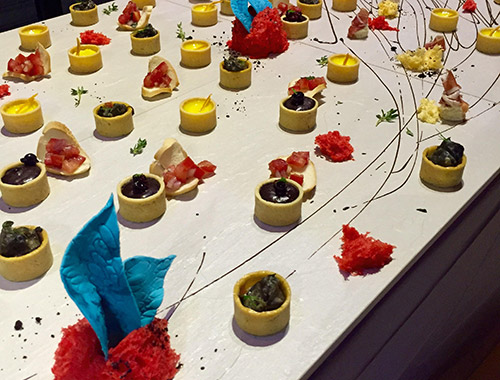As philosophers, we are often preoccupied with the nature of perception and the complex ways in which our senses shape our understanding of the world around us. When it comes to the act of consuming a meal, this profound interplay between environment and gustatory experience becomes particularly intriguing.
Consider the simple act of tasting a morsel of food. On the surface, it may seem like a straightforward sensory experience, a mere matter of the taste buds registering the flavors and textures of the item in question. But delve deeper, and you will find that the environmental context in which we partake of a meal can profoundly influence our perception of its very essence.
The ambiance of the dining space, the company we keep, the background music, even the plates and utensils we use – these seemingly peripheral elements can dramatically alter our experience of a dish, imbuing it with layers of meaning and nuance that transcend the purely gustatory.
A delicate croissant, for instance, may taste vastly different when savored in the bustling setting of a Parisian sidewalk café versus the serene surroundings of a picnic in the French countryside. The former may evoke a sense of hurried sustenance, while the latter may inspire a deeper appreciation for the simple pleasure of nourishment.
However, one could argue that this hyper-focus on environmental factors diminishes the true essence of the food itself, reducing the act of eating to a mere performance rather than a genuine celebration of the culinary craft. After all, should not the intrinsic qualities of the dish be the primary driver of our gustatory experience?
As we ponder the nature of taste, then, we must strike a delicate balance between acknowledging the profound influence of environment and maintaining a steadfast appreciation for the inherent artistry of the food we consume. For in doing so, we unlock a deeper understanding of the human condition and the profound ways in which our senses and our surroundings converge to create the tapestry of our lived experiences.
哲學盛宴:環境如何塑造我們的味覺體驗
身為哲學家,我們常常專注於感知的本質,以及我們的感官塑造我們對周遭世界理解的複雜方式。當談到用餐的行為時,環境與味覺體驗之間的深刻互動就變得特別有趣。
試想一下品嚐食物的簡單動作。表面上看來,這似乎是一種簡單直接的感官體驗,僅僅是味蕾感受到食物的味道和口感而已。但深入了解之後,您會發現用餐時的環境氛圍會深刻地影響我們對食物本質的感知。
用餐空間的氛圍、陪伴我們的同伴、背景音樂,甚至是我們使用的盤子和器皿,這些看似周邊的元素都能大幅改變我們對某道料理的體驗,為其賦予超越純粹味覺的層次意義和細微差別。
舉例來說,一個精緻的牛角包,在巴黎路邊咖啡館的熙來攘往與在法國鄉間野餐的寧靜環境中品嚐,味道可能大不相同。前者可能會喚起一種匆忙的飽足感,而後者可能會讓人更深刻地體會到美味所帶來的簡單樂趣。
然而,有人可能會說,這種對環境因素的過度關注削弱了食物本身的真正精髓,使飲食行為淪為一種純粹的表演,而不是對烹飪工藝的真正讚揚。畢竟,菜餚本身的特質不應該是我們味覺體驗的主要動力嗎?
因此,當我們思考味覺的本質時,我們必須在承認環境的深遠影響與保持對食物固有藝術性的堅定欣賞之間,取得微妙的平衡。如此一來,我們就能更深入了解人類的處境,以及我們的感官與周遭環境交織成我們生活經驗的深刻方式。






